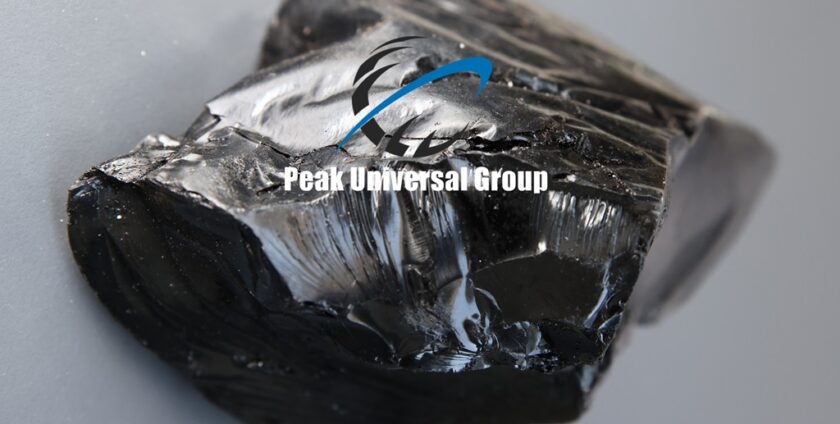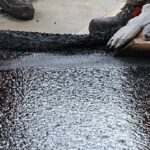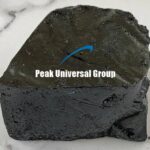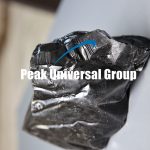
How Oxidized Bitumen is Produced? Its Uses, Applications, Benefits & Price Factors
How Oxidized Bitumen is Produced? Oxidized bitumen, also known as blown asphalt, Blown Bitumen or oxidized asphalt, is a versatile and essential material widely used in various industrial applications. Its unique properties make it a preferred choice in construction, waterproofing, and other sectors.
This blog delves into the detailed aspects of oxidized bitumen, including its production process, uses, applications, benefits, how oxidized bitumen used? and price factors, with Peak Universal Business as a leading supplier.
What is Oxidized Bitumen?
Blown Asphalt is a type of bitumen that has undergone an oxidation process to enhance its properties, such as increased softening point and reduced penetration. This makes it more suitable for applications requiring high temperature resistance and durability. It is commonly referred to as blown asphalt due to the air blowing process used in its production.
Key Characteristics:
- Increased Softening Point: Higher resistance to deformation under high temperatures.
- Reduced Penetration: Enhanced hardness and durability.
- Elasticity: Improved flexibility, making it ideal for various applications.
- Chemical Resistance: Superior resistance to chemicals, acids, and alkalis.
The Air-Blowing Process Explained in Oxidized Bitumen Produced?
The air-blowing process is a thermal-oxidative method where hot air is injected into bitumen under controlled conditions.
🧪 Step-by-Step Production Process
-
Selection of Base Material
High-quality penetration-grade bitumen (typically 60/70 or 80/100) is used. -
Heating Phase
Bitumen is heated to 230–270°C in a blowing reactor with agitation to ensure uniform heat distribution. -
Air Injection (Oxidation)
Dry air is blown through the molten bitumen. This process introduces oxygen, which reacts with hydrocarbons, resulting in polymerization and oxidation. -
Controlled Monitoring
Parameters like air flow rate, temperature, and blowing time (often 2–4 hours) are monitored to reach desired specifications. -
Cooling and Packaging
The finished product is cooled and packaged in bags, drums, or bulk blocks, depending on the application.
Quality Control
Quality control is a crucial aspect of the production process. Samples of the oxidized bitumen are tested at various stages to ensure that the final product meets the required specifications. Tests include:
- Penetration Test: Measures the hardness of the bitumen.
- Softening Point Test: Determines the temperature at which the bitumen softens.
- Ductility Test: Assesses the flexibility of the bitumen.
- Solubility Test: Ensures the bitumen is soluble in specific solvents.
Physical and Chemical Changes During Production
| Property | Before Air Blowing | After Air Blowing |
|---|---|---|
| Softening Point (°C) | 45–55 | 90–130 |
| Penetration (0.1 mm) | 60–100 | 5–25 |
| Ductility (cm @25°C) | >100 | <1 |
| Viscosity (cSt @ 135°C) | Lower | Higher |
| Solubility in TCE (%) | >99 | >99 |
-
How Oxidized Bitumen used?
Uses and Applications of Blown Bitumen
Oxidized bitumen’s enhanced properties make it suitable for a wide range of applications. Here are some of its primary uses and applications:
Construction Industry
- Roofing:
- Roofing Felts: Used in the manufacture of roofing felts, providing waterproofing and durability.
- Roof Coatings: Applied as a protective coating on roofs to enhance weather resistance.
- Waterproofing:
- Basement Waterproofing: Used to prevent water ingress in basements and underground structures.
- Foundation Coatings: Applied to foundations to protect against moisture and chemical attacks.
Road Construction
- Road Maintenance:
- Crack Sealing: Used in sealing cracks on pavements to prevent water infiltration and extend the life of the road.
- Joint Fillers: Employed as joint fillers in concrete pavements to accommodate thermal expansion and contraction.
- Asphalt Mixes:
- Hot Mix Asphalt: Enhances the properties of asphalt mixes, providing better performance under high temperatures.
Industrial Applications
- Pipe Coatings:
- Corrosion Protection: Used as a coating for pipelines to prevent corrosion and extend their lifespan.
- Adhesives and Sealants:
- Industrial Adhesives: Acts as a binder in adhesives used in various industrial applications.
- Sealants: Provides excellent sealing properties in construction and industrial sealants.
- Electrical Applications:
- Insulation: Used as an insulating material in electrical components due to its dielectric properties.
Other Applications
- Paints and Coatings:
- Protective Coatings: Used in industrial paints and coatings to provide durability and chemical resistance.
- Marine Coatings: Employed in coatings for ships and marine structures to protect against saltwater corrosion.
- Printing Inks:
- Ink Production: Used as a component in printing inks to enhance gloss and adhesion.
-
How Oxidized Bitumen is Produced?
💡 Benefits of the Oxidation Process
-
Improved Temperature Stability
Enables performance in hot climates or high-temperature environments. -
Enhanced Water Resistance
Ideal for waterproofing membranes and sealing applications. -
Better Aging Characteristics
Slows degradation, increasing material life. -
Rigidity and Strength
Suitable for heavy-duty industrial applications.
Benefits of Blown bitumen
Oxidized bitumen offers several benefits that make it a preferred choice in various industries. Here are some of its key advantages:
- High Temperature Resistance:
- Oxidized bitumen has a higher softening point compared to regular bitumen, making it suitable for applications exposed to high temperatures.
- Durability:
- The reduced penetration and increased hardness enhance the durability and longevity of the material.
- Flexibility:
- Despite its hardness, oxidized bitumen retains a degree of flexibility, allowing it to withstand thermal expansion and contraction.
- Chemical Resistance:
- Superior resistance to chemicals, acids, and alkalis ensures long-term performance in harsh environments.
- Waterproofing Properties:
- Excellent waterproofing properties make it ideal for applications requiring moisture protection.
- Cost-Effectiveness:
- Provides a cost-effective solution for various industrial applications, offering long-term savings due to its durability.
Common Grades Produced
Popular oxidized bitumen grades include:
-
85/25 – General roofing and coating
-
90/10 – Pipe coating, tank lining
-
115/15 – High-temperature insulation and expansion joints
Each grade differs in softening point and penetration, tailored to specific applications.
Price Factors of Blown Bitumen
The price of Blown Bitumen can vary based on several factors. Understanding these factors can help in making informed purchasing decisions:
- Quality and Specifications:
- The quality and specific properties of the oxidized bitumen, such as softening point and penetration, can influence the price. Higher quality bitumen with superior properties typically commands a higher price.
- Production Costs:
- The cost of production, including raw material costs, energy consumption, and labor, affects the final price of the product. Efficient production processes can help in reducing costs.
- Supply and Demand:
- Market dynamics, including the supply and demand of oxidized bitumen, can impact prices. High demand and limited supply can drive prices up.
- Geographic Location:
- The location of the supplier and the cost of transportation can affect the price. Proximity to the production site can reduce transportation costs and lower the overall price.
- Packaging and Storage:
- The type of packaging and storage requirements can also influence the price. Specialized packaging for ease of handling and storage may add to the cost.
- Market Conditions:
- Economic factors, including inflation, exchange rates, and market trends, can impact the price of oxidized bitumen.
Peak Universal Business: Your Trusted Supplier of Oxidized Bitumen
Peak Universal Business is a leading supplier of high-quality Blown Bitumen. Here’s why you should choose us:
- Quality Assurance:
- We adhere to strict quality control standards to ensure that our oxidized bitumen meets the highest industry standards.
- Wide Range:
- We offer oxidized bitumen in various grades and specifications to meet diverse industrial needs.
- Expertise:
- With extensive experience in the industry, we provide expert advice and support to help you select the right product for your application.
- Competitive Pricing:
- We offer competitive prices without compromising on quality, ensuring you get the best value for your investment.
- Customer Support:
- Our dedicated customer support team is always ready to assist with any queries or special requirements.
❓ FAQ – Oxidized Asphalt Production
What raw material is used to produce Oxidized asphalt?
It starts with penetration-grade bitumen (like 60/70 or 80/100) as the base for oxidation.
Is the process eco-friendly?
The production emits controlled levels of gases, but with proper filtration, environmental impact is minimized.
What are the by-products of the process?
There are no significant by-products. The process mainly modifies the physical structure of bitumen.
Can it be customized?
Yes, manufacturers can adjust blowing time and temperature to meet required specs for various industries.
✅ Conclusion-How Oxidized Bitumen Produced?
Blown Bitumen, also known as blown asphalt or oxidized asphalt, is a versatile and valuable material with a wide range of industrial applications. Its unique properties, including high temperature resistance, durability, flexibility, and chemical resistance, make it an ideal choice for construction, road maintenance, waterproofing, and various other sectors. Despite its advantages, understanding the price factors and selecting a reliable supplier like Peak Universal Business can help in making the most of this essential material.
With Peak Universal Business as your trusted supplier, you can be assured of high-quality oxidized bitumen that meets your specific needs. Whether you require oxidized bitumen for roofing, waterproofing, industrial applications, or any other purpose, we have the expertise and resources to deliver exceptional products and services.
You can Read More about Oxidized Bitumen Here:
What is Blown asphalt 75/25 and its Industrial Applications?
How Blown asphalt 115/15 is Produced ?
Blown asphalt 90/40 and Its uses
Blown bitumen for Construction & Roofing Industry
Applications & Properties of Blown bitumen 85/40
📣Call to Peak Universal Business
🔍 Looking for high-quality Oxidized Bitumen with precise specifications?
We in Peak Universal Business, supply high-quality Oxidized Bitumen in all grades, with custom packaging, competitive prices, and global delivery.
👉 Request a Quote Today
📧 Email: [email protected]
📞 Phone: +971 4 878 2031
🌐 Visit: https://publtd.com/contact/
📦 Minimum Order: 20 MT | Packaging: Kraft Bags / Drums / Bulk
If You have any other Query or Question you want to ask, Please don’t hesitate to Contact Us.
- 0 comment





Leave a Reply